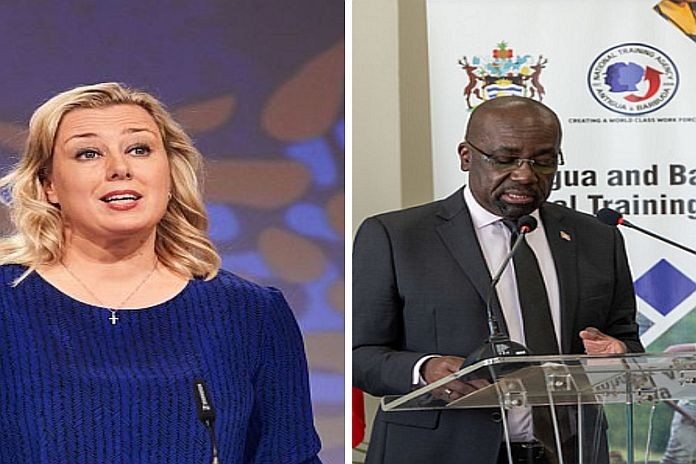BRIDGETOWN, Barbados – Leaders representing 16 Caribbean countries met with the European Commissioner for International Partnerships Jutta Urpilainen in Barbados and agreed on main priorities for the cooperation that the EU will dedicate to the Caribbean until 2027.
The EU and Caribbean countries will work together through three partnerships under the Global Gateway, respectively focusing on “Green Deal”, “Economic Resilience and Trade” as well as “Governance, Security and Human Development”. As part of these partnerships, the ministers also agreed on concrete actions to fight climate change, protect biodiversity, foster digital innovation and mobility of students and university staff.
The chair of CARIFORUM E.P. Chet Greene, minister of foreign affairs of Antigua and Barbuda and European Commissioner Jutta Urpilainen officially launched the new partnerships, in the presence of Barbadian prime minister Mia Mottley, the CARICOM & CARIFORUM secretary general, Dr Carla Barnett, and the vice-president of the European Investment Bank Ricardo Mourinho. The EU will contribute to the programmes and projects under the partnerships with a total contribution of over €800 million until 2027.
European Commissioner for International Partnerships, Jutta Urpilainen, said:
“The three partnerships launched today roll out the EU’s Global Gateway strategy in the Caribbean. Global Gateway is our offer to partner countries for sustainable and trusted connections. It will help to address the most pressing global challenges, from fighting climate change, to improving health systems, and boosting competitiveness and security of global supply chains. As the Russia’s aggression of Ukraine and the COVID-pandemic have made these challenges even more acute, we want to help our partners in addressing them and tackle inequalities. I am pleased to reaffirm our strong partnership with the Caribbean with a solid contribution of over €800 million until 2027.”
At the launch of the new partnerships, the chair of CARIFORUM, E.P. Chet Greene, expressed deep appreciation on behalf of the governments and people of the region for the significant economic and developmental support provided by the European Union over the years. He further described the relationship with the EU as mature, with the expectation that the partnership will be further enhanced through effective and efficient coordination among the Parties.
Minister Greene welcomed further discussion with the EU under the framework of the Neighbourhood, Development and International Cooperation Instrument (NDICI-Global Europe) by stating:
“I look forward to greater understanding, flexibility and real cooperation between both sides on the different high priority issues raised. Greene expressed a desire to see that, “the principles of aid effectiveness remain a constant, whatever the aid delivery framework. CARIFORUM expects that given our historical relationship, the Parties can continue to find meaningful cooperation and partnership that brings lasting prosperity to all of CARIFORUM, including through the new funding framework under which we will now cooperate.”
The Caribbean and the EU leaders reiterated their readiness to step up collaboration to push for a green, inclusive and digital transition including at global level where both partners together can exercise leadership in multilateral fora. The Caribbean leaders welcomed the extension of the EU Flagship programme on Climate Change in Latin America, EUROCLIMA, to the Caribbean. The programme will support Caribbean partners with €35 million to achieve their commitments under the Paris Agreement.
European Commissioner Urpilainen announced a number of new initiatives, such as €5 million to foster digital innovation in the Caribbean and its readiness to explore possibilities for an extension of the BELLA optic cable to the region and to support the convergence of the rules and standards in the whole Latin America and Caribbean region. The Commissioner also highlighted the recent additional allocation of €36,5 million to the Caribbean as part of the EU´s global efforts to mitigate the impact of the Russia war of aggression against Ukraine that will support the most vulnerable people to cope with the current food security crisis and related economic shocks.
Leaders also agreed on the importance to engage with youth and strengthening the mobility between both regions.
Both sides emphasised the mutual commitment to build stronger political, economic and social ties between the Caribbean region and the European Union, and advanced working modalities for coordination to further strengthen development cooperation. The Ministerial Meeting contributed to strengthen the EU-LAC partnership more widely. In 2023, an EU-LAC Summit will be organised to bring together the leaders of Europe with those of Latin America and the Caribbean around joint priorities and deliverables.
Background
The new relationship of the Caribbean and the European Union for cooperation under the new EU financial instrument “Global Europe” is articulated around three partnerships. The Caribbean-EU partnership on “Green Deal”, it opens the possibility for cooperation between the European Union and the Caribbean to work jointly to increase the resilient of the region to the impact of climate change and natural hazards and push forward the green transition. The partnership on Economic Resilience and Trade will facilitate the promotion of sustainable growth of the private sector and the trade opportunities of the Economic Partnership Agreement (EPA). The third partnership focuses on Governance, Security and Human Development with the objective to make Caribbean societies safer, more inclusive and resilient.
These partnerships roll out EU’s Global Gateway strategy in the region. Global Gateway is the EU’s contribution to narrowing the global investment gap worldwide. It is in line with the commitment of the G7 leaders from June 2021 to launch a values-driven, high-standard and transparent infrastructure partnership to meet global infrastructure development needs. The Global Gateway is also fully aligned with the UN’s Agenda 2030 and it’s Sustainable Development Goals, as well as the Paris Agreement.





